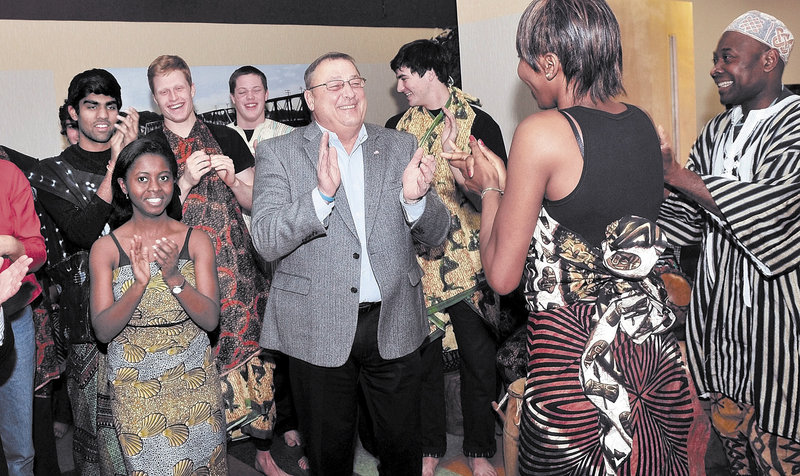WATERVILLE – Gov. Paul LePage was again in the spotlight on Martin Luther King Jr. Day, but not because of any controversy with the NAACP.
This time he found himself center stage dancing to African music at the 26th annual community breakfast at the Muskie Center, hosted by Spectrum Generations and the Waterville Rotary Club.
The former Waterville mayor was a reluctant performer.
Messan Jordan Benissan, a master drummer who led Colby College students in the Colby African Drumming Ensemble, invited LePage to dance. Blushing, the governor smiled and shook his head, as if to refuse.
Waterville’s new mayor, Karen Heck, took LePage by the hand and led him through the crowd to the front of the room, to applause and cheers.
“I said, ‘C’mon, let’s go dance,’ ” Heck said later, as LePage clapped and danced with the Colby drumming group and third-graders from George J. Mitchell School.
Despite the commotion, LePage’s appearance was more low-key than last year.
Shortly after being inaugurated in 2011, he declined an invitation from the NAACP Portland Branch to attend a breakfast in that city, saying he had prior commitments. Pressed on why he was declining, LePage said at the time that he would not be held hostage by special interests. LePage famously added, “Tell ’em to kiss my butt” if they want to “play the race card.”
He declined a similar invitation by the Portland NAACP this year, saying he had committed to attending the Waterville event. As a member of the Waterville Rotary Club and a former Waterville mayor, LePage traditionally had attended the Muskie Center breakfast.
Before ceremonies started Monday, LePage said it was great seeing all of his old friends and fellow Rotarians.
“It’s a real pleasure to be home,” he said. “We moved to Waterville in 1979. We lived here, worked here and raised our family here and I wish I could come back more often, but unfortunately, I got stuck in Augusta.”
His comment drew laughter.
LePage proclaimed Jan. 16 the Martin Luther King Jr. Day of Service, speaking briefly to the crowd, which included Rotarians, city officials, educators, children, retired people and others.
“Enjoy the day and remember community service really counts,” he said.
The Rev. Arlene Tully of Pleasant Street United Methodist Church spoke about King’s legacy and his commitment to social justice rooted in the ethic of love.
King believed that love could be the answer to the problems of humankind and that people should express love in compassionate actions toward others, but also use love to further social justice, Tully said.
“For instance, he said that helping someone fix up their substandard housing was a personal act of love, but love must also address the poverty that created the unlivable conditions,” Tully said. “It was a loving thing to sympathize with a black friend who was denied equal rights, but that support wasn’t enough without also working to change the unjust system that denied him those rights.”
King believed that love is a form of power – that love, seeking justice for all people, was very effective in the civil rights movement, she said. While some people thought love represented weakness and submission, King knew it was the ultimate position of strength, Tully said.
“Violence, force, hatred, hostility or coercion could never have achieved what love accomplished,” she said. “As Dr. King famously said, ‘Hate cannot drive out hate; only love can do that.’ “
Morning Sentinel Staff Writer Amy Calder can be contacted at 861-9247 or at:
acalder@centralmaine.com
Send questions/comments to the editors.



Success. Please wait for the page to reload. If the page does not reload within 5 seconds, please refresh the page.
Enter your email and password to access comments.
Hi, to comment on stories you must . This profile is in addition to your subscription and website login.
Already have a commenting profile? .
Invalid username/password.
Please check your email to confirm and complete your registration.
Only subscribers are eligible to post comments. Please subscribe or login first for digital access. Here’s why.
Use the form below to reset your password. When you've submitted your account email, we will send an email with a reset code.